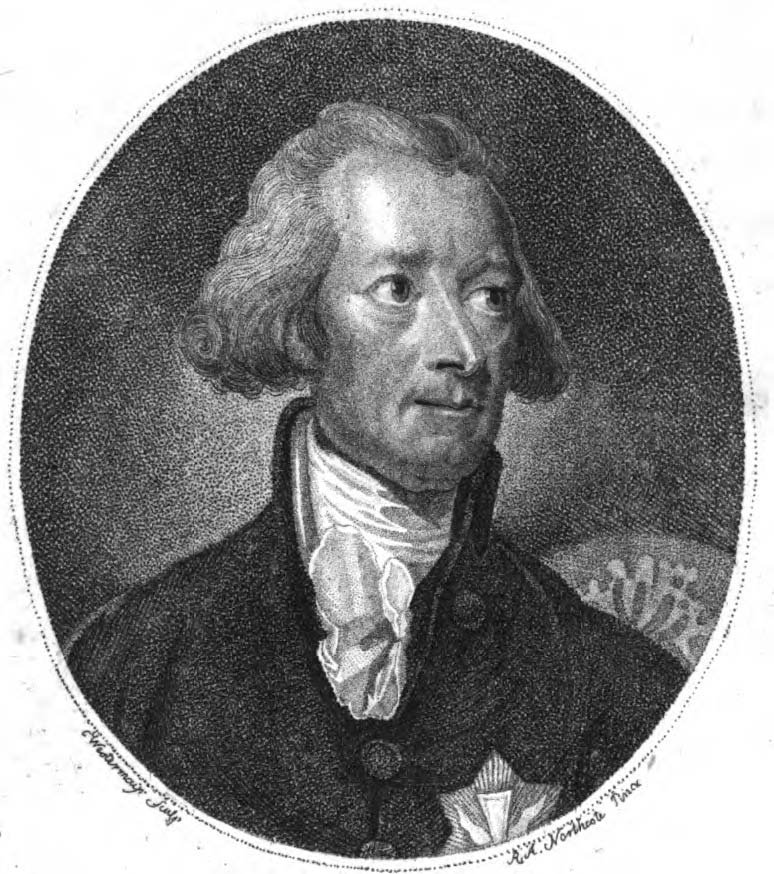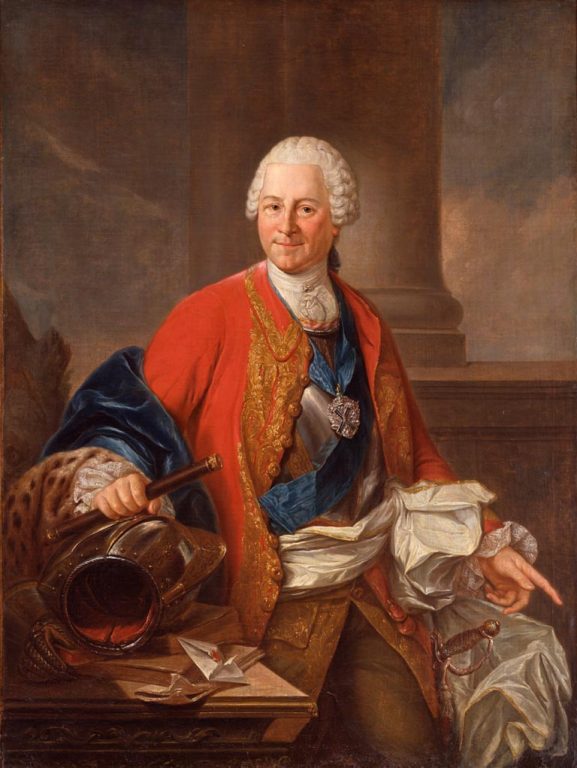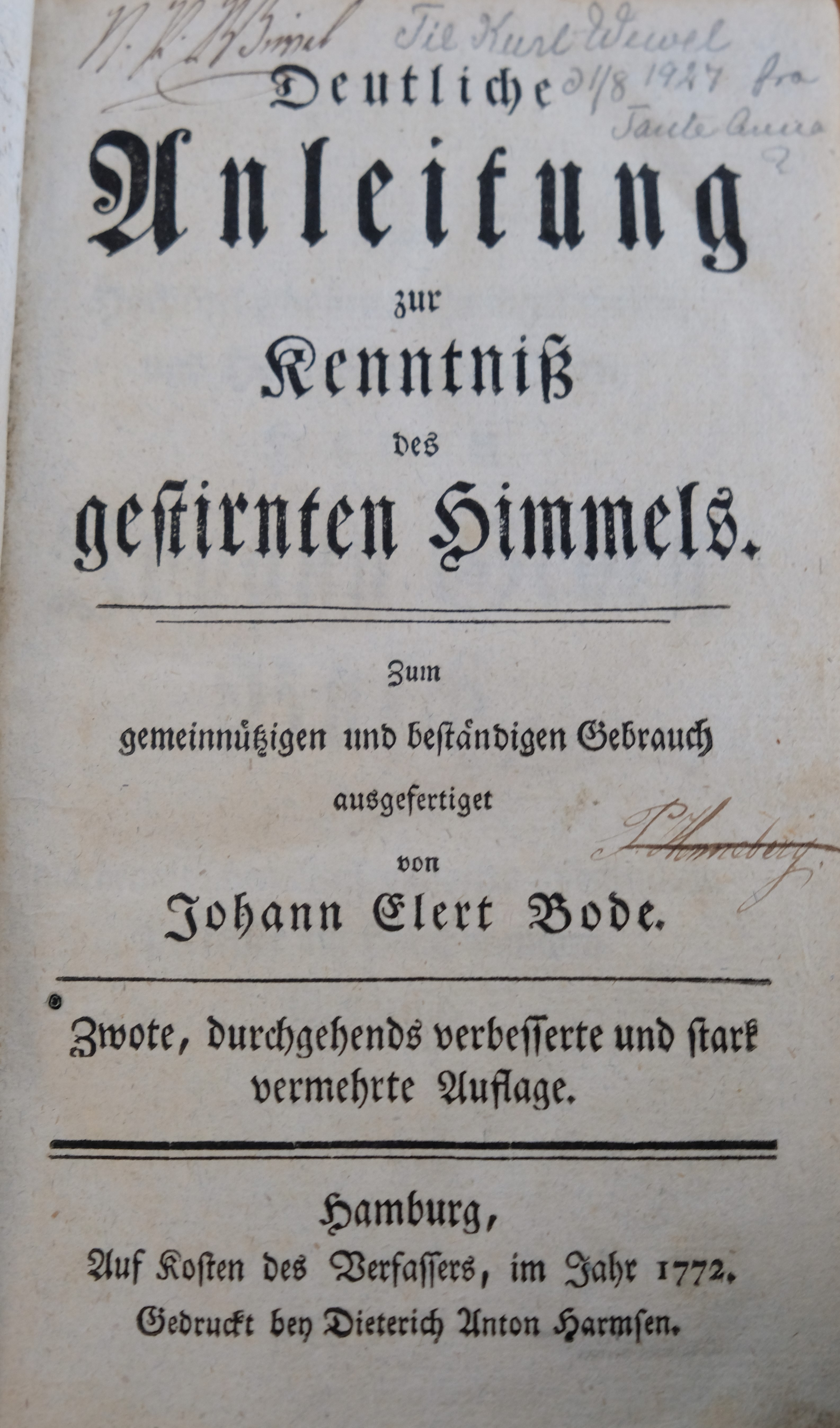|
Hans Moritz Von Brühl
Hans Moritz von Brühl (20 December 1736 – 9 June 1809) was a German diplomat and astronomer, resident for much of his life in London, where he was known as John Maurice, Count of Brühl. Life He was the son of F. W. Graf von Brühl of Martinskirchen, who died in 1760, and nephew of the Polish-Saxon statesman Heinrich von Brühl. Born at Wiederau (Pegau), Wiederau in the Electorate of Saxony, he studied at Leipzig, and there formed a close friendship with Christian Gellert, who corresponded with him for some years. At Paris, in 1755, Brühl, then in his nineteenth year, took an active part in Saxon diplomacy, and was summoned to Warsaw in 1759. He was named, through his uncle's influence, chamberlain and commandant in Thuringia, and in 1764 appointed ambassador extraordinary to the court of St. James's. He loved astronomy and promoted its interests. Through his influence Franz Xaver von Zach, who entered his family as tutor shortly after his arrival in London in November 1783, ... [...More Info...] [...Related Items...] OR: [Wikipedia] [Google] [Baidu] |
Heinrich Von Brühl
Heinrich, count von Brühl ( pl, Henryk Brühl, 13 August 170028 October 1763), was a Polish-Saxon statesman at the court of Saxony and the Polish–Lithuanian Commonwealth and a member of the powerful German von Brühl family. The incumbency of this ambitious politician coincided with the decline of both states. Brühl was a skillful diplomat and cunning strategist, who managed to attain control over of Saxony and Poland, partly by controlling its king, Augustus III, who ultimately could only be accessed through Brühl himself. Polish historian and writer Józef Ignacy Kraszewski wrote a novel under the title ''Count Brühl'', in which he described Heinrich as an oppressive and stubborn dictator, who, with greed, but also great determination, unsuccessfully attempted to gain control of the entire nation. It is widely believed that Brühl had Europe's largest collection of watches and military vests; attributed to him was also a vast collection of ceremonial wigs, hats and the l ... [...More Info...] [...Related Items...] OR: [Wikipedia] [Google] [Baidu] |
William Herschel
Frederick William Herschel (; german: Friedrich Wilhelm Herschel; 15 November 1738 – 25 August 1822) was a German-born British astronomer and composer. He frequently collaborated with his younger sister and fellow astronomer Caroline Herschel (1750–1848). Born in the Electorate of Hanover, William Herschel followed his father into the military band of Hanover, before emigrating to Great Britain in 1757 at the age of nineteen. Herschel constructed his first large telescope in 1774, after which he spent nine years carrying out sky surveys to investigate double stars. Herschel published catalogues of nebulae in 1802 (2,500 objects) and in 1820 (5,000 objects). The resolving power of the Herschel telescopes revealed that many objects called nebulae in the Messier catalogue were actually clusters of stars. On 13 March 1781 while making observations he made note of a new object in the constellation of Gemini. This would, after several weeks of verification and consultation ... [...More Info...] [...Related Items...] OR: [Wikipedia] [Google] [Baidu] |
German Diplomats
German(s) may refer to: * Germany (of or related to) **Germania (historical use) * Germans, citizens of Germany, people of German ancestry, or native speakers of the German language ** For citizens of Germany, see also German nationality law **Germanic peoples (Roman times) * German language **any of the Germanic languages * German cuisine, traditional foods of Germany People * German (given name) * German (surname) * Germán, a Spanish name Places * German (parish), Isle of Man * German, Albania, or Gërmej * German, Bulgaria * German, Iran * German, North Macedonia * German, New York, U.S. * Agios Germanos, Greece Other uses * German (mythology), a South Slavic mythological being * Germans (band), a Canadian rock band * "German" (song), a 2019 song by No Money Enterprise * ''The German'', a 2008 short film * "The Germans", an episode of ''Fawlty Towers'' * ''The German'', a nickname for Congolese rebel André Kisase Ngandu See also * Germanic (other) * Germa ... [...More Info...] [...Related Items...] OR: [Wikipedia] [Google] [Baidu] |
Counts Of Germany
Count (feminine: countess) is a historical title of nobility in certain European countries, varying in relative status, generally of middling rank in the hierarchy of nobility. Pine, L. G. ''Titles: How the King Became His Majesty''. New York: Barnes & Noble, 1992. p. 73. . The etymologically related English term "county" denoted the territories associated with the countship. Definition The word ''count'' came into English from the French ''comte'', itself from Latin ''comes''—in its accusative ''comitem''—meaning “companion”, and later “companion of the emperor, delegate of the emperor”. The adjective form of the word is "comital". The British and Irish equivalent is an earl (whose wife is a "countess", for lack of an English term). In the late Roman Empire, the Latin title ''comes'' denoted the high rank of various courtiers and provincial officials, either military or administrative: before Anthemius became emperor in the West in 467, he was a military ''comes ... [...More Info...] [...Related Items...] OR: [Wikipedia] [Google] [Baidu] |
1809 Deaths
Eighteen or 18 may refer to: * 18 (number), the natural number following 17 and preceding 19 * one of the years 18 BC, AD 18, 1918, 2018 Film, television and entertainment * ''18'' (film), a 1993 Taiwanese experimental film based on the short story ''God's Dice'' * ''Eighteen'' (film), a 2005 Canadian dramatic feature film * 18 (British Board of Film Classification), a film rating in the United Kingdom, also used in Ireland by the Irish Film Classification Office * 18 (''Dragon Ball''), a character in the ''Dragon Ball'' franchise * "Eighteen", a 2006 episode of the animated television series ''12 oz. Mouse'' Music Albums * ''18'' (Moby album), 2002 * ''18'' (Nana Kitade album), 2005 * '' 18...'', 2009 debut album by G.E.M. Songs * "18" (5 Seconds of Summer song), from their 2014 eponymous debut album * "18" (One Direction song), from their 2014 studio album ''Four'' * "18", by Anarbor from their 2013 studio album '' Burnout'' * "I'm Eighteen", by Alice Cooper commonly ... [...More Info...] [...Related Items...] OR: [Wikipedia] [Google] [Baidu] |
1736 Births
Events January–March * January 12 – George Hamilton, 1st Earl of Orkney, becomes the first Field Marshal of Great Britain. * January 23 – The Civil Code of 1734 is passed in Sweden. * January 26 – Stanislaus I of Poland abdicates his throne. * February 12 – Francis I, Holy Roman Emperor marries Maria Theresa of Austria, ruler of the Habsburg Empire. * March 8 – Nader Shah, founder of the Afsharid dynasty, is crowned Shah of Iran on a date selected by court astrologers. * March 31 – Bellevue Hospital is founded in New York. April–June * April 14 – The Porteous Riots erupt in Edinburgh (Scotland), after the execution of smuggler Andrew Wilson, when town guard Captain John Porteous orders his men to fire at the crowd. Porteous is arrested later. * April 14 – German adventurer Theodor Stephan Freiherr von Neuhoff is crowned King Theodore of Corsica, 25 days after his arrival on Corsica on March 20. His reign ends on No ... [...More Info...] [...Related Items...] OR: [Wikipedia] [Google] [Baidu] |
Allgemeine Encyclopädie Der Wissenschaften Und Künste
The ''Allgemeine Encyclopädie der Wissenschaften und Künste'' ("Universal Encyclopaedia of Sciences and Arts") was a 19th-century German encyclopaedia published by Johann Samuel Ersch and Johann Gottfried Gruber, therefore also known as the "Ersch-Gruber." One of the most ambitious encyclopaedia projects ever, it remains uncompleted. It was designed and begun in 1813 by Professor Ersch to satisfy the wants of Germans, only in part supplied by foreign works. It was stopped by the Napoleonic Wars until 1816, when Professor Gottlieb Hufeland joined, but he died on November 25, 1817, while the specimen part was at press. The first volume appeared in Leipzig in 1818. The editors of the different sections at various times were some of the best-known men of learning in Germany, including Gruber, M.H.E. Meier, Hermann Brockhaus, W. Müller and A.G. Hoffmann of Jena. Naturalist Eduard Poeppig wrote most of the articles on the Americas The Americas, which are sometimes collectiv ... [...More Info...] [...Related Items...] OR: [Wikipedia] [Google] [Baidu] |
George Carpenter, 2nd Baron Carpenter
Lieutenant-Colonel George Carpenter, 2nd Baron Carpenter FRS (c. 1695 – 12 July 1749) of the Homme, Dilwyn, Herefordshire was an English landowner and Member of Parliament at different periods between 1717 and 1747. Personal details George Carpenter was born sometime in 1695 at Ocle Pychard, only son of George Carpenter, 1st Baron Carpenter (1657-1732) and Alice Caulfield (1660-1731). In August 1722, Carpenter married Elizabeth Petty (1707?-1791); they had two surviving children, George (1723-1762) and Alicia (c.1726-died 1794). Both made extremely beneficial marriages; George became Earl of Tyrconnell, while Alicia was Lady of the Bedchamber to Queen Charlotte and married the Earl of Egremont, who was Secretary of State from 1761 to 1763. Career Carpenter held a number of commissions in his father's regiment, the 3rd The King's Own Hussars, including Lieutenant in 1708 when he was 13 and Captain in 1712, but does not appear to have served. Regiments and commissions we ... [...More Info...] [...Related Items...] OR: [Wikipedia] [Google] [Baidu] |
Alicia Wyndham, Countess Of Egremont
Alicia Wyndham, Countess of Egremont (c.1726 – 1 June 1794), formerly the Hon. Alicia Maria Carpenter, was the wife of Charles Wyndham, 2nd Earl of Egremont. She was the daughter of George Carpenter, 2nd Baron Carpenter of Killaghy, a soldier and MP, and his wife, the former Elizabeth Petty. Her brother, George, became Earl of Tyrconnell. Alicia married the earl on 12 March 1750. The earl and countess had six children: *George O'Brien Wyndham, 3rd Earl of Egremont (1751–1837), who succeeded his father in the earldom; * Lady Elizabeth Alicia Maria Wyndham (1752–1826), who married Henry Herbert, 1st Earl of Carnarvon, and had children; * Lady Frances Wyndham (1755–1795), who married Charles Marsham, 1st Earl of Romney, and had children; * Hon. Percy Charles Wyndham (1757–1833), who died unmarried; * Hon. Charles William Wyndham (1760–1828), who married Lady Anne Barbara Frances Villiers and had no children; * Hon. William Frederick Wyndham (1763–1828),. Note: T ... [...More Info...] [...Related Items...] OR: [Wikipedia] [Google] [Baidu] |
Royal Society
The Royal Society, formally The Royal Society of London for Improving Natural Knowledge, is a learned society and the United Kingdom's national academy of sciences. The society fulfils a number of roles: promoting science and its benefits, recognising excellence in science, supporting outstanding science, providing scientific advice for policy, education and public engagement and fostering international and global co-operation. Founded on 28 November 1660, it was granted a royal charter by King Charles II as The Royal Society and is the oldest continuously existing scientific academy in the world. The society is governed by its Council, which is chaired by the Society's President, according to a set of statutes and standing orders. The members of Council and the President are elected from and by its Fellows, the basic members of the society, who are themselves elected by existing Fellows. , there are about 1,700 fellows, allowed to use the postnominal title FRS (Fellow of the ... [...More Info...] [...Related Items...] OR: [Wikipedia] [Google] [Baidu] |
Thomas Mudge (horologist)
Thomas Mudge (1715 – 14 November 1794, London) was an English horologist who invented the lever escapement, a technological improvement to the pocket watch. Early life Thomas Mudge was the second son of Zachariah Mudge, headmaster and clergyman, and his wife, Mary Fox. He was born in Exeter, but when he was young, the family moved to Bideford, where his father became headmaster of the grammar school. Thomas attended the same school and, when 14 or 15, was sent to London to be apprenticed to George Graham, a clock and watch maker who had trained under Thomas Tompion. Graham’s business was situated in Water Lane, Fleet Street. When Mudge qualified as a watchmaker in 1738 he began to be employed by a number of important London retailers. Whilst making a most complicated equation watch for clockmaker John Ellicott, Mudge was discovered to be the actual maker of the watch and was subsequently directly commissioned to supply watches for Ferdinand VI of Spain. He is known to ... [...More Info...] [...Related Items...] OR: [Wikipedia] [Google] [Baidu] |
Johann Elert Bode
Johann Elert Bode (; 19 January 1747 – 23 November 1826) was a German astronomer known for his reformulation and popularisation of the Titius–Bode law. Bode determined the orbit of Uranus and suggested the planet's name. Life and career Bode was born in Hamburg. As a youth, he suffered from a serious eye disease that particularly damaged his right eye; he continued to have trouble with his eyes throughout his life. His early promise in mathematics brought him to the attention of Johann Georg Büsch, who allowed Bode to use his own library for study. He began his career with the publication of a short work on the solar eclipse of 5 August 1766. This was followed by an elementary treatise on astronomy entitled ''Anleitung zur Kenntniss des gestirnten Himmels'' (1768, 10th ed. 1844), the success of which led to his being invited to Berlin by Johann Heinrich Lambert in 1772 for the purpose of computing ephemerides on an improved plan. There he founded, in 1774, the well-known ... [...More Info...] [...Related Items...] OR: [Wikipedia] [Google] [Baidu] |







